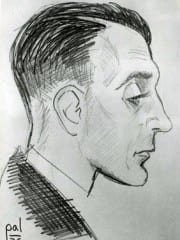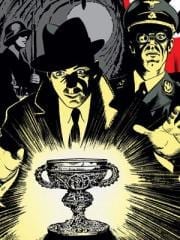Montsalvache
Otto Rahn in Jones' Celtic Encyclopedia
b. February 18, 1904; Michelstadt, Germany.
d. March 13, 1939; Tyrolean Mts.
Poet, mystic, and Nazi researcher. Rahn was obsessed with two ideas--the Holy Grail and the Cathars, medieval French heretics; while in college, he had intended to write a dissertation on the hypothetical Kyot, the supposed troubador who gave Wolfram von Eschenbach the story of Parzival.
In 1929, he made a special trip to the Languedoc region of Southern France, a hotbed of Catharist activities in the thirteenth century. He began excavating at Montsegur, the last Cathar stronghold to fall to the Inquisition. Legend had it that the Cathars had a great treasure which was never found, but hidden deep in the mountainside. Rahn was convinced that this treasure was the Holy Grail, and he intended to find it.
Raiders of the Lost Grail
Berlin between the wars was a city known throughout Europe for its bohemian subculture of young intellectuals. Amongst the personalities who hotly debated the many modernist “isms” that were fracturing the old ideological certainties which had glued together the 19th century, few individuals were more colourful than a dark-haired, green-eyed young man named Otto Wilhelm Rahn. His gaunt figure, swathed in characteristic black coat and fedora, casts a long shadow out of those twilight years, a ‘great silhouette’ around which the most extravagant myths accrued. He was variously said to be a Mason, a Rosicrucian, a Luciferian, an agent of the Thule Gesellschaft, an initiated Cathar and even the leader of an obscure, international secret society. As author Philip Kerr puts it, Rahn’s contemporaries might not have been surprised to see “the Scarlet Woman and the Great Beast come flying out of the front door” of his apartment on Tiergartenstrasse. One of his Nazi peers in Heinrich Himmler’s Black Order remarked in an internal memo that he “half suspected Rahn of being in league with the little people”. To this day, it is widely believed that this enigmatic young man knew the whereabouts of one of the most sacred relics in all Christendom – the Most High Holy Grail. But the truth is stranger still…



Commentaires récents
il y a 13 années 50 semaines
il y a 13 années 50 semaines
il y a 13 années 50 semaines
il y a 13 années 51 semaines
il y a 14 années 2 semaines
il y a 14 années 7 semaines